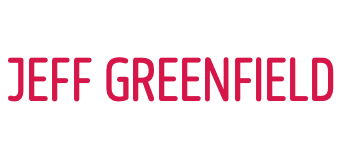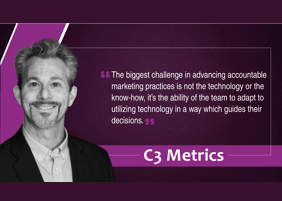Attribution Predictions 2019: Interview with Jeff Greenfield
Tell us about your role and journey into technology. How did you co-start C3 Metrics?
While working in the world of product placement and branded entertainment, I was lucky enough to meet my C3 Metrics Co-Founder Mark Hughes. A marketing legend, Hughes convinced a town to rename themselves from Halfway, Oregon to Half.com Oregon, creating both the first ‘dot-com’ town and one of the most memorable company launches.
The worldwide attention attracted eBay and shortly thereafter Half.com was acquired. With the release of his best-selling book ‘Buzzmarketing: Get People To Talk About Your Stuff,’ Mark and I started working together to solve in-depth marketing problems for a number of Fortune 500 brands.
The biggest problem we faced was how to properly credit and ‘attribute’ what marketing tactics were actually working. We worked with the former CEO of Nielsen and created a software that captures all consumer touch points in order to see what was working and what was not.
Besides keeping our product pipeline growing, my number one role at C3 Metrics is to ensure we keep our culture intact. We’ve grown quickly as a company and both Mark and I make a conscious effort to keep diversity, inclusion and transparency at the forefront of everything we do to create a great environment for everyone to thrive together as a team.
What is C3 Metrics and how is it different from other attribution providers?
C3 Metrics is truly ‘Built By Marketers’. Mark and I built C3 Metrics to solve problems we were facing ourselves. We’ve faced the same pressures as every one of our clients and we used C3 Metrics daily to solve those problems.
As data and the sources for that data grew, we developed the only Attribution Data Cloud to unify user journey data across channels and platforms to integrate with proprietary viewability, fraud controls and cross-device. We are the only ones to distribute attribution credit algorithmically through our Attribution Data Cloud and as a result, we are the source of truth and decision making in our industry.
What is the current state of Attribution Platforms? How does C3 Metrics deliver on its ROI promises?
The promise of MTA is massive, but the lack of standards is leading to backwards movement and confusion among marketers. We’re seeing providers ignoring industry standards such as viewability and fraud, which had led to poor outcomes. At C3 Metrics, as we incorporate all of the industry standards and guidelines surrounding viewability and fraud, we’re able to guarantee our ROI promises in every client contract. Attribution works, but only if you follow established industry standards.
Could you elaborate more on the recent recognition by the Marketing Accountability Standards Board (MASB)?
It’s been far too long that Marketers have been given the short end of the stick — one day they have budget and then it’s taken away, so Finance can ‘hit their numbers’. We’re working with the MASB to move Marketing up to the same level as Finance and get the recognition it deserves at the board level. Most marketers are shocked to learn that less than 3 percent of all public company boards have a representative from Marketing and MASB is all about changing that. We’re excited to be working with MASB members to improve marketing accountability and recognition.
Which Marketing and Sales Automation tools and technologies do you currently use?
We use Salesforce in combination with Outreach, Zoom and Slack. We also rely heavily on a number of proprietary tools for our Sales Automation needs.
What are the biggest challenges in advancing into the accountable marketing practices? How does C3 Metrics help customers on this front?
The biggest challenge in advancing accountable marketing practices is not the technology or the know-how, it’s the ability of the team to adapt to utilizing technology in a way which guides their decisions. Everyone wants better measurement and ROI, but to do so requires an organizational shift, which has to come from the analyst level all the way up to the board. That’s where our team of professionals and dedicated resources come in — we’re there to help that paradigm make its way through an organization.
Could you tell us about an outstanding digital campaign from your experience?
We have a B2B client who was targeting enterprise users and spending heavily in all digital channels — predominately in paid search, where they were ‘seeing’ some decent results. They saw minimal ROI in programmatic display and as a result, they decreased their programmatic spend.
When they started working with C3 Metrics, they discovered that programmatic display was actually increasing awareness at the top of their sales funnel and that paid search was simply lower funnel activity that would have come naturally. As a result, they shifted some spend from paid search to programmatic display and saw their cost per lead drop by 25% and leads go up 37% without spending any additional money.
What are your predictions on the most impactful disruptions in Marketing Operations for 2018-2020?
Two major disruptions coming to Marketing Operations are:
1) Unification of Brand & Media Teams. Traditional brand and media metrics live in different worlds and don’t talk to each other. We’re going to see unification of brand metrics with multitouch attribution (MTA), which will finally unify brand and media teams to be working together.
2) MTA Accreditation/Standards to be established. The measurement industry is currently lacking standards, given that accreditation had been non-existent, but the Media Ratings Council has come out with viewability accreditation. With upcoming MTA /Attribution accreditation, marketers will have more confidence and more quickly embrace measurement changes from ‘last click’ to MTA.
What startups in the technology industry are you watching keenly right now?
Very impressed with the team at OpenSense and their utilization of email as a marketing channel — in addition to C3 Metrics, Salesforce is also a customer. Also watching Walmart’s digital side — operating like a start-up and on track to massively disrupt Amazon.
How do you prepare for an AI-centric world as a business leader?
As a leader, you need to keep one eye on the future and dedicate resources to always be testing new technology and integrate where it makes sense. Our team started testing AI a number of years ago and we currently have aspects of AI in both our infrastructure and underlying algorithms. The key is to be constantly testing and looking ahead.
How do you inspire your people to work with technology?
Technology should assist both your work and home life — not impede in your day-to-day routine. Far too often, we see tech get in the way — we see that daily in our business. You’re working, trying to do your job and all of a sudden, there’s a new ‘tool’ that is supposed to help you do your job better. It may help — but there’s a learning curve and it becomes a major hassle as you do your day job plus learn this new tech. Part of my job is to help this transition and demonstrate how tech (if used properly) can save countless hours each week and provide more time to think, relax and enhance your life.
One word that best describes how you work.
Focused.
What apps/software/tools can’t you live without?
I’ve fallen in love with my Apple Watch. Blown away with the new ECG feature and encouraged to see future medical integrations — it’s like we’re finally living in the era of The Jetsons! Can’t live without SnagIt — this simple screenshot/video tool from TechSmith is in constant use and my Sonos helps turn our home into a nightly 80’s dance party.
What’s your smartest work-related shortcut or productivity hack?
Hiring an executive assistant to handle all my email and calendar related duties — shout out to Jen Fox, my lifeline to the virtual world of email hell. You don’t know how much your productivity is hindered until you realize how much time you spend answering emails and managing your calendar. The constant interruptions hinder your ability to focus and actually take time to think about the future of your company (and your life).
What are you currently reading?
I’m in the middle of two books ‘Benjamin Franklin: An American Life’ by Walter Isaacson on my Kindle and ‘The Art of Fermentation’ by Sandor Katz in the hardback version. The New York Times is my daily paper (also on my Kindle) and the rest of my news tends to come from Hacker News.
What’s the best advice you’ve ever received?
The best advice I ever received is “It’s a temporary situation.” Incredible advice for both bad and good times. When you’re in the middle of an awful scenario (which happens a lot in business), it’s great to be able to remind yourself that the awfulness is temporary and will soon change — sometimes for the better, other times for worse — but it’s never stationary.
When times are great, it’s even more important to remind yourself that this too is temporary, yet with proper guidance can continue in the right direction. This mindset helps you keep one foot in the present and the other one always navigating the future.
Something you do better than others – the secret of your success?
The secret to my success has been to constantly reinvent myself by always learning. Life is a long journey, filled with many types of people and challenges. Success is the result of confronting difficult situations with both skill and knowledge.
Tag the one person (or more) in the industry whose answers to these questions you would love to read:
Tim Barnes, Chief Data Officer at AT&T advertising and Analytics
Keith Block, Co-Chief Executive Officer at Salesforce
Gary Laben, CEO Dynata/Research Now/SSI
This article originally appeared in Martech Advisor

